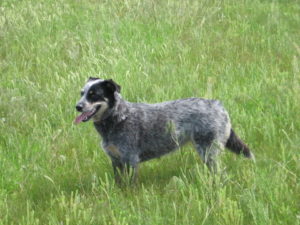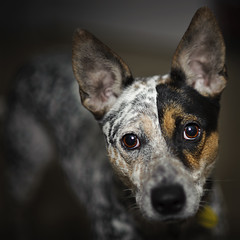 The Blue Heeler is a dog that sometimes has a bit of a bad reputation. Some see this breed as being one of the most aggressive because of their herding history. As a result, some will not entertain the idea of bringing one into a family home. Yet, there are plenty of Blue Heeler owners that say that they are perfect for the home because of their traits as both a family pet and a guard dog. So, can you bring these animals in to guard your home or is it safer to turn to a different breed?
The Blue Heeler is a dog that sometimes has a bit of a bad reputation. Some see this breed as being one of the most aggressive because of their herding history. As a result, some will not entertain the idea of bringing one into a family home. Yet, there are plenty of Blue Heeler owners that say that they are perfect for the home because of their traits as both a family pet and a guard dog. So, can you bring these animals in to guard your home or is it safer to turn to a different breed?
Is the Blue Heeler a good guard dog
The Blue Heeler was originally bred as a herding dog but are in fact are also a great guard dog for protecting your property and even their owners and family members, Being bred to work for a human handler makes them extremely loyal and protective of their owner and people they know.
They have all the traits required from a good guard dog including being highly intelligent, naturally protective and are a lot more powerful than their size indicates.
There are two sides to the Blue Heeler.
When we look at the personality traits of the Blue Heeler we see a dog with two different approaches to humans. If he knows that you are a friend, an owner to obey or a “pack” member to protect then he will do all he can to be a great companion. If he doesn’t know you, he may become a little cautious and possibly protective of those humans that he does know. This is why this breed makes such a great guard dog. You have that ideal blend of loyalty and protectiveness that all guard dogs need to successfully defend their home.
Blue Heelers as family pets
The popularity of the Australian Cattle Dog as a working dog derives from this loyalty and eagerness to please their master. They will devote themselves to those they serve and to their duties. Traditionally, this means working on cattle farms as a herding dog. They will work long hours and follow commands with ease. This desire to please their owner continues when they are family pets. They still want to be the best possible companion and help their owners where possible. This loyalty translates over into duties as a guard dog instead. They will want to stand guard and take care of the home.
That said, we shouldn’t simply view this animal as a working dog. Once they get attached to their families they can become devoted, friendly companions. They will love to play with the children in the household – and any adults that want to join in. They will enjoy long walks in the countryside and being pampered at home. It is important to understand that a Blue Heeler is a high energy working dog and they do require a lot of exercise and mental stimulation. To learn more about how to exercise a Blue Heeler or Cattle dog see here.
Are Blue Heelers overprotective?
Just be aware that this dog can be extremely protective of younger family members at times, to the point of exhibiting herding behavior. At first, you might find that this is quite comical as the dogs follow young children like a second shadow.
You might also find that this is a helpful form of secondary child-care when the dogs are on hand to stop kids from wandering off. But, there is the potential issue here of them nipping at the child’s ankles. This is where that name comes from. The dogs will nip at the heels of cattle to get them to head in the right direction. They work with an entirely different method to your typical sheepdog. You will need to train this behavior out of them without causing them to lose that protective streak.
This protective nature can have its downsides when it comes to taking the dog out in public. There is a good chance that you will meet friends or converse with strangers in parks and stores. But, Blue Heeler owners sometimes find that their dog gets a bit aggressive and protective here. It doesn’t know this new person or trust them to get too close to the family.
Also, make sure that that the dog gets the chance to form strong bonds with every member of the home. They need to accept everyone as a member of the pack or else they might get possessive and protective in the wrong situations. Blue Heeler owners have struggled to introduce new partners to the household because the dog sees them as a threat.
Does this mean that these dogs are too aggressive to be guard dogs in family homes?
 There are a few issues to consider regarding Blue Heeler aggression. There are a few potential reasons for this behavior. First of all, some see that nipping behavior as a sign that the dog is aggressive to children and will potentially cause real harm. It is important to stress here that this is not an aggressive act but a protective one.
There are a few issues to consider regarding Blue Heeler aggression. There are a few potential reasons for this behavior. First of all, some see that nipping behavior as a sign that the dog is aggressive to children and will potentially cause real harm. It is important to stress here that this is not an aggressive act but a protective one.
It can be distressing to have these dogs snap at children but they are unlikely to aggressively bite them. Others may have handled Australian Cattle Dogs in the past and been unable to control them because they didn’t provide the right training or exercise regime to keep them under control. Then there are those rescue dogs that may have been mistreated in the past. This is why training is so important in all these situations.
With the right training, you can ensure that this dog’s bark is worse than its bite. You want them to be able to stand their ground when strangers come to the home but to also stand down when you assure them that everything is OK.
Will Blue Heelers attack intruders?
These dogs may go for the ankles of an intruder and try and choose them away if they are perceived to be a direct threat to the family. But, if they have entered your home and are indeed a threat, this could be a good thing. Your dog’s loyalty will ensure that it does what it can to keep you all safe.
Are Blue Heelers good guard dogs?
With the right approach, you can create a strong relationship with a Blue Heeler that means that they are keen to protect you and your family. It is all about finding that fine line between a protective dog and an aggressive one. Reward their loyalty and success when acting as a guard dog at home but also try to curtail those desires to nip at the ankles. It can take a lot of dedicated work but you can ensure that your Australian Cattle Dog is a loyal, devoted and loving member of the family.
Blue Heeler related posts you may like
How to exercise a Blue Heeler or Cattle Dog